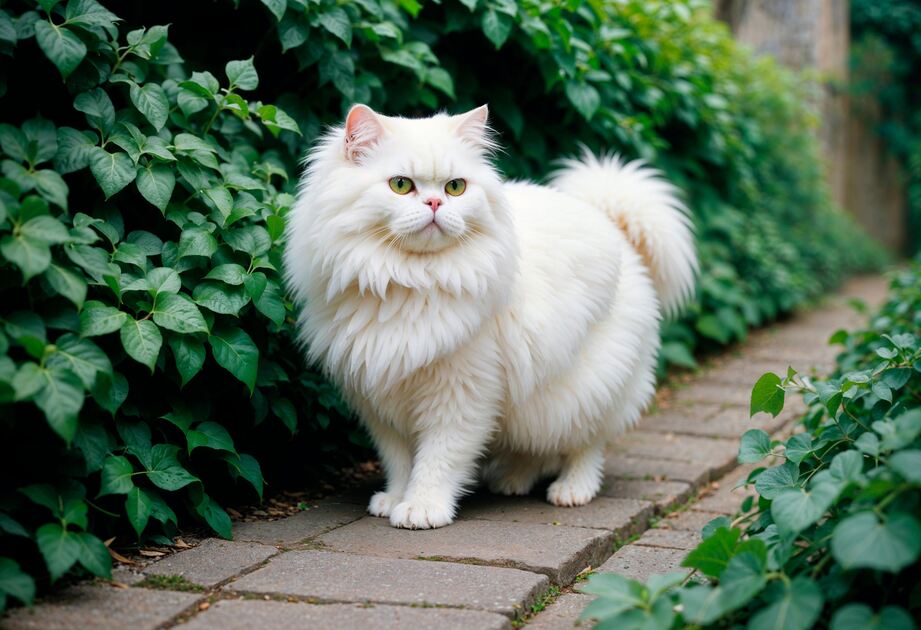
Birman cats have gorgeous coloring and are lively, fun-loving creatures. They can be found in a range of hues, such as seal, chocolate, tortie, and cream. All Birmans, though, have entirely white paws. They are kind, loving cats that get along well with kids and enjoy hanging out with their owners. A Birman cat would make a wonderful addition to your family or home. Taking good care of your Birman will require you to buy a few necessities, attend to your cat’s bodily needs, and spend lots of time petting and playing with your furry friend.
The Birman as the “Mitted Cat”
You have a unique cat! She has purred her way into your heart and feels your moods and day-to-day activities. Most likely, you chose her out of preference for Birmans and because you thought she would possess qualities that would fit your lifestyle, such as:
1. Maybe when she misses you, she’ll “chirp” or “meow” to let you know.
2. A loving family pet and companion that gets along well with kids and other pets
3. Little grooming is necessary; wonderful companion
For optimal health, take note of the following characteristics:
1. Requires consistent exercise and food control to prevent gaining weight.
2. Shows signs of separation anxiety if left alone too much; needs the company of other dogs or people; does not perform well in solitude
Your Birman’s Well-being
We are aware of your deep concern for your cat and your want to provide her with the best care possible. We have therefore outlined the health issues that we will be talking about with you during your Birman’s lifetime.
Numerous illnesses and ailments are genetic, meaning they have a connection to the breed of your pet. There is considerable agreement among feline genetic experts and veterinary practitioners that the problems we shall discuss here have a high incidence rate or a major influence on this breed in particular. Your cat may be more vulnerable than other cats, but this does not imply that she will experience these issues. To give you a sense of what can arise in the future, we shall outline the most prevalent problems that Birmans encounter. Since we obviously cannot address every scenario here, please always contact us if you observe any strange symptoms or indicators.
General Health Information Birman Cat
Weight Management of Birman Cat
A significant percentage of illnesses and fatalities in cats are caused by obesity, which is a major disease. Unhealthy weight is a major contributing factor to the onset of diabetes, arthritis, and other serious illnesses.
Excess weight can shorten a pet’s life by up to two years and accelerate the onset of arthritis by two years, according to research. Overweight dogs are far more likely to acquire diabetes, a genetic disease that may never affect a healthy-weight cat. A cat’s likelihood of developing diabetes increases with its level of obesity. When an overweight cat stops eating for any reason, hepatic lipidosis, often known as fatty liver, can develop in as little as 48 hours and is another potentially fatal illness in overweight pets.
Dental Diseases
When pets don’t have their teeth washed regularly, dental disease is one of the most prevalent chronic issues. Your cat may experience potentially dangerous dental issues if you don’t provide them with further assistance and care. Food particles are the first sign of dental disease. They solidify into tartar, which forms on the tooth’s visible surface and ultimately causes gum and tooth root infections. Removing food residue from your cat’s teeth regularly will help shield them against dental disease.
Immunization-Preventable Infections
Similar to other felines, Birmans are prone to bacterial and viral ailments such as rabies, calicivirus, rhinotracheitis, and panleukopenia. Vaccination can help avoid these infections. The associated vaccinations are known as “core” vaccines, and since there is a significant probability that your cat will get these illnesses, all cats should have them. Vaccines are also available to guard against other serious illnesses, such as the feline leukemia virus (FeLV). We will take your cat’s age, lifestyle-specific risk factors, and the frequency of these diseases in our community into account when recommending vaccinations for her.
Insects
The inside and exterior of your Mitted Cat can become infested with a variety of worms and bugs. Her skin and ears could become infected with fleas, ticks, or ear mites. There are several ways that hookworms, roundworms, heartworms, and whipworms might enter her system, including through mosquito bites, contaminated soil, and drinking tainted water. There are severe concerns regarding certain parasites that could infect you or a family member. We must regularly check for parasites because they can cause pain, misery, and even death for your feline pet.
Neuter or Spay?
Spaying or neutering your Birman is one of the best things you can do for her. This technique entails the surgical removal of the testicles in males and the ovaries and, typically, the uterus in females. Neutering especially reduces the incidence of urine spraying and marking behaviors in males, and both sexes often become less territorial and roam less. By performing this procedure, we also have the opportunity to identify and treat some of the ailments your cat is prone to get while they are sedated.

Genetic Tendencies in Birmans
Arterial Thromboembolism in the Birman Cat Breed
FATE (feline aortic thromboembolisms) are blood clots that can form in the arteries of cats suffering from heart disease. Most frequently, blood clots lodge just beyond the aorta, the main blood channel that supplies the body with blood from the heart, obstructing the hind legs’ normal blood flow. This can cause paralysis, cold pain, or paralysis in one or both of the hind legs.
Anaemia
A class of blood clotting disorders known as hemophilia is characterized by excessive and continuous bleeding from wounds on the body. Cats may experience mild to severe symptoms from a variety of these hereditary blood diseases. Haemophilia diseases can be fatal, nevertheless, even in mild forms. Before an injury or operation, a cat with hemophilia may appear normal; only then might dangerous, protracted bleeding start.
Blood Type
Individual cats have distinct blood types, much like people. The majority of domestic cats have blood type A, while purebred cats—like your Birman—typically have blood type B or, in rare cases, type AB. Finding out your cat’s blood type in advance can save vital minutes because it’s necessary to initiate a transfusion before beginning. While blood typing is advised for all cats, purebred cats should pay particular attention to this.
Neonatal Haemolytic Icterus/Isoerythrolysis (NI)
An uncommon immune-mediated condition known as neonatal isoerythrolysis, or NI, develops when a newborn kitten with type A blood drinks colostrum, or first milk, from a mother with type B blood, or vice versa. Because the mother’s colostrum contains immunity against type A blood, the antigen is ingested by the nursing kitten and enters its bloodstream. The immune response that follows causes the kitten’s red blood cells to be attacked and destroyed by antibodies. As a result, sick kittens typically pass quite soon after birth.
Tips for Caring for Your Birman Cats
Casual Maintenance
Regular grooming is one of the most important aspects of care for a Birman cat. To avoid tangles and remove stray hair, brush your Birman cat’s coat at least twice a week. For optimal outcomes, utilize a slicker brush or a stainless steel comb. Brushing the coat regularly also helps maintain its luster and health by distributing natural oils.
Seasonal Hair Drying
Birman cats don’t need to be bathed too often, but once in a while can help keep their coats tidy and oil-free. Make careful to rinse well after using a mild cat shampoo to avoid leaving behind any residue that can irritate their skin. One of the fundamental needs of Birman cat care is giving them a proper wash.
Care For The Ears and Eyes
Check the ears of your Birman cat frequently for indications of infection, wax accumulation, or debris. Cotton balls and an ear cleaner recommended by their veterinarian can be used to clean their ears. Additionally, use a moist cloth to clean their eyes to get rid of any discharge and avoid leaving tears behind. An essential part of the Birman cat’s care regimen is giving it proper ear and eye care.
A Fit Diet
Your Birman cat’s health and well-being depend on you giving it a balanced diet. Make sure the proteins, lipids, and vital components in their diet are of the highest caliber. Give your Birman cat commercial cat food of the highest caliber that satisfies AAFCO (Association of American Feed Control Officials) nutritional guidelines.
It’s important to select a diet that promotes their general health, even though both wet and dry food options can be appropriate.

Display Mode
To avoid obesity, make sure to maintain appropriate portion control. Ascertain your cat’s age, weight, and activity level when determining portion sizes, and adhere to the feeding recommendations supplied by the cat food manufacturer. For advice on a particular diet, speak with your veterinarian. A vital component of the Birman cat’s care requirements is portion control.
Clean Water
Make sure that fresh water is always available for your Birman cat. Using a cat water fountain can encourage them to drink more water, which is important for their health. An essential part of the care needs for the Birman cat is maintaining proper hydration.
Periodic Veterinary Examinations
To keep an eye on and preserve your Birman cat’s health, routine veterinary care is necessary. Plan routine veterinary examinations to maintain up-to-date immunizations, dental treatment, and general health evaluations. Usually, yearly checkups are enough, but senior cats might benefit from more frequent examinations. For a Birman cat, routine examinations are essential to their maintenance.
Fitness and Development
Playful and energetic, Birman cats need mental and physical engagement daily to maintain good health. To keep your Birman cat entertained, give them a range of interactive toys. Feather wands and laser pointers are examples of toys that imitate prey and can assist sate their hunting instincts. Perches, shelves, and cat trees are examples of climbing structures that offer chances for both mental and physical stimulation.
Community Relations
Birman cats are renowned for being gregarious and loving. They can develop close relationships with their owners and thrive on human connection. Give your Birman cat lots and lots of love and care. They take pleasure in being near and cuddling with their human friends. To keep them happy and satisfied, set aside time for gentle touching and interaction.
Community
Birman cats prefer to be with their families and dislike being left alone for extended periods. If you find yourself going away regularly, think about getting another pet for company. A vital component of the Birman cat’s care needs and one that enhances their general well-being is companionship.
Conclusion
To guarantee that your Birman cat has a long and happy life, you must be aware of their care needs. You may provide your Birman cat with a loving and caring environment by giving it regular veterinarian treatment, exercise, social interaction, balanced food, and adequate grooming. With the correct care, these gorgeous and loving cats can grow to be valued members of your family and make amazing companions.
FAQs
Birman cats are known for their striking blue eyes, silky coat, and friendly, affectionate nature. They are often described as gentle, intelligent, and sociable, making them wonderful companions.
Birmans have a long, silky coat that can become tangled if not groomed regularly. Aim to brush your Birman at least once a week to prevent mats and keep their fur in top condition.
A balanced diet with high-quality cat food is essential for Birmans. Look for food that provides complete nutrition, including protein, vitamins, and minerals. Consult your vet for specific dietary recommendations.
Birmans enjoy interactive play and mental stimulation. Provide toys, climbing structures, and regular playtime to keep them engaged. Puzzle toys and scratching posts are also great for their well-being.




